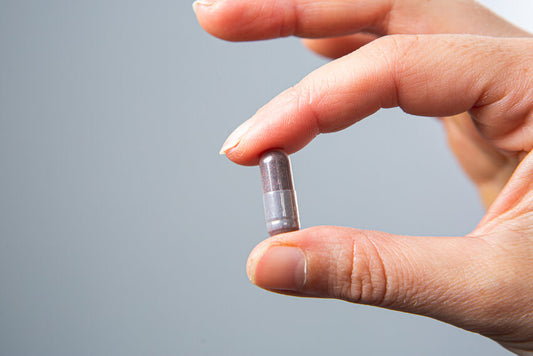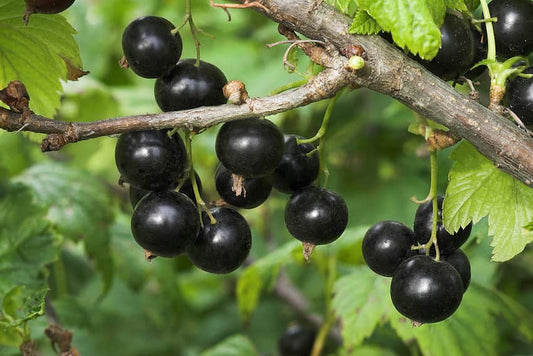When it comes to supplements, you'll see many vitamins, minerals, fruit extracts, vegetable extracts, herbal tinctures, tonics, and the list goes on for various health conditions or to improve a specific organ system.
But one you rarely see is blackcurrant extract, maybe in drinks, but not in supplements.
It's a berry powerhouse that's been used for centuries for all sorts of ailments including metabolic conditions, diabetes, cardiovascular issues, and more.
This article is everything you need to know about blackcurrant extract—what it is, why it's beneficial for your health, and how you can use it safely to maximize its benefits.
What Is Blackcurrant Extract?
Blackcurrant (Ribes nigrum) is a woody shrub native to central Europe and northern Asia that's known for its berries, as they're a particularly rich source of vitamin C and polyphenols 1.
The berries are generally eaten raw and have a strong, tart flavor, but they can also be cooked for use in both sweet and savory dishes or dried and ground to make a powder.
But blackcurrant has become so popular because of the polyphenol phytochemicals present in the fruit, leaves, and seeds, which have been studied for their potent biological activities.
Blackcurrant seed oil is also a rich source of vitamin E and unsaturated fatty acids, including alpha-linolenic acid (ALA) and gamma-linolenic acid (GLA) 2.
Blackcurrant Phytochemicals
Many of the health benefits linked to blackcurrants are because of its biochemical makeup, specifically flavonoids, polyunsaturated fatty acids (PUFAs), structural and nonstructural carbohydrates, non-volatile organic acids, tannins, and stilbenoids 1.
Blackcurrants serve as a concentrated and important source of flavonoids, particularly anthocyanins, which have concentrations up to four-fold greater than other fruits.
Studies show that the anthocyanin content of blackcurrants averages between 8 and 80mg per 100g of fruit with maximum levels observed up to 300mg per 100g of fruit 3.
Four major anthocyanins have been identified in blackcurrants: delphinidin-3-O-glucoside, delphinidin-3-O-rutinoside, cyanidin-3-O-glucoside, and cyanidin-3-O-rutinoside.
Besides anthocyanins, blackcurrants are also a concentrated source of flavonols, three in particular: quercetin, myricetin, and kaempferol 1.
It is also a good source of vitamin C, an essential non-volatile organic acid that also happens to be a powerful antioxidant and free radical scavenger.
Nutrient Powerhouse
If there's any hesitation as to why you should add blackcurrant to your supplement repertoire, the nutrient content of the berry speaks for itself:
- Vitamin A
- Vitamin B5, B6, B1
- Vitamin E
- Vitamin C
- Potassium
- Iron
- Manganese
The most significant of nutrients, however, is vitamin C, with as much as four times the amount of vitamin C in citrus fruits and nearly double the levels of antioxidants as blueberries.
Blackcurrant Health Benefits
Studies into the therapeutic benefits of blackcurrant have found many biological benefits.
It's anti-inflammatory
Blackcurrant seed oil is a rich source of GLA (a precursor to DGLA), alpha-linolenic acid (ALA), and stearidonic acid, which are all precursors to EPA, a polyunsaturated fatty acid with strong links to improved heart health and function.
Studies show that blackcurrant may help to suppress levels of TNF-a in the presence of lipopolysaccharide (LPS), an immunogenic bacterial agent that stimulates a systemic inflammatory response in the body 1.
With ingestion of blackcurrant, molecules downstream of TNF-a, including NF-kB and IL-6, were also downregulated, further contributing to inhibition of cytokine production and reducing inflammation 4.
It's an antioxidant
The antioxidant capacity of blackcurrant is by far one of the most well-known benefits, especially for ocular health.
States of increased oxidative stress are common to disease development, smoking, and physical exercise in unconditioned individuals.
Still, many studies support the ability of blackcurrant to neutralize hydrogen peroxide (H2O2) and nitric oxide (NO), both of which are radicals, as well as impede the propagation of lipid and protein peroxidation 1.
Interestingly, it also appeared to increase antioxidant enzymes concentrations, including glutathione (GSH) peroxidase and superoxide dismutase 5.
But the potent antioxidant capacity of blackcurrant is largely attributed to its phenolic and anthocyanin content, which may vary depending on cultivation, growing season, fruit ripening, and the part of the plant used. High levels of vitamin C also confers its inherent antioxidant properties.
It's also antimicrobial
High levels of anthocyanins have been shown to elicit antimicrobial effects against certain strains of bacteria.
Researchers suggest that a mechanism of action could involve blocking interactions between mucosal epithelial cells and the organism's surface receptors, thereby preventing proliferation.
Anthocyanins extracted from blackcurrants have also been shown to have potent activity against influenza viruses A and B, which can inactivate both viruses and prevent spread directly 6.
And helps reduce cholesterol
If you struggle with high cholesterol or maintaining appropriate levels of cholesterol, blackcurrant may be for you.
Some evidence suggests that blackcurrant seed oil may help regulate cholesterol levels.
A 2010 study published in Phytotherapy Research found that regular consumption of blackcurrant seed oil may improve total cholesterol levels and reduce serum triglyceride levels, as well as increase serum HDL 7.
Another small study published in the Journal of Nutritional Biochemistry found that blackcurrant seed oil was more effective than fish oil for decreasing LDL cholesterol levels 8.
Benefits To The Body Systems
Want more focus on an individual system? Here's what blackcurrant can do for you:
- Eyes: Anthocyanoside concentrate administered among 12 healthy volunteers appeared to cause vasodilation of ocular blood vessels and increased blood flow into the eyes, as well as reduce visual fatigue 9. The anthocyanins in blackcurrants also appear to aid in the regeneration of rhodopsin in rod photoreceptors and improve dark adaptations 10.
- Brain/nervous system: Many of the chemicals found in blackcurrants that possess antioxidant activity have potential neuroprotective effects. One study showed that blackcurrant seed oil might improve serum fatty acid composition in people who have had a stroke, which mitigates poor lipid profile 11.
- Bone: Blackcurrant seed oil may reduce morning stiffness in people with rheumatoid arthritis by reducing levels of IL-13, IL-1, TNF-a, and other inflammatory markers. Prodelphinidins in blackcurrant extract have also shown positive results against the degenerative processes associated with osteoarthritis, as well as reducing pain intensity 12.
- Wounds: One of the major benefits of blackcurrant for wound healing is its ability to taper the inflammatory process. An interesting study into the effects of GLA supplementation on patients with burn injuries showed that plasma levels of anti-inflammatory agents like GLA, DGLA, and PgE increased, while levels of pro-thrombotic, pro-inflammatory compounds like thromboxane B2 decreased 13.
- Heart: Studies have shown that blackcurrant seed oil may inhibit platelets by way of its polyunsaturated fatty acids, such as GLA, and potentiate an anticoagulant effect by inhibiting the formation of fibrin. Specifically, one study found that 500ml of blackcurrant juice reduced serum inflammatory markers 14. There is also some evidence to suggest it may improve serum lipid profiles 15.
- Skin: High concentrations of the fatty acid GLA found in blackcurrant may reduce the severity of atopic dermatitis and other types of skin conditions 16.
How To Use It
If you're looking to get your hands on some blackcurrant, there are a few options available for you.
- Juice
- Extracts (powders)
- Seed oil
- Pills/capsules
You can also eat raw or dried blackcurrant berries; however, they are extremely tart, so most people prefer other forms.
Alternatively, here's where else you can find it: Performance Lab Vision.

Performance Lab Vision is a unique blend of botanical antioxidants for ultramodern eyesight, giving you sharp, crystal-clear visual performance and boosting overall eye health.
It's designed for high-speed focus, motion detection, and night vision, while also reducing vision-impairing effects of glare and fighting macula-damaging effects of blue light rays.
What You'll Find in Performance Lab Vision:
Lutein, 10 mg + Zeaxanthin 2 mg - Lutein and zeaxanthin are two of the best research-backed botanical nutrients for enhancing both vision performance and long-range eye health. They work by:
- Naturally migrating to the eye's macula, the central part of the retina responsible for clear eyesight
- Forming macular pigment, a protective yellow layer that coats the retina and absorbs photoreceptor-damaging blue light rays
- Strengthening natural eye defenses: lutein and zeaxanthin are the primary antioxidants that protect retinal health and lens clarity
They also enhance visual acuity, glare recovery, and contrast sensitivity.
European Blackcurrant, 25 mg extract (25% anthocyanins + 2.2% C3G) + 300 mg freeze-dried powder - Blackcurrants supply anthocyanin antioxidants that sharpen vision and support healthy blood flow to the eyes.
One specific antioxidant, a purple plant pigment called C3G (Cyanidin-3-Glucoside), helps the retina regenerate rhodopsin, a compound required for night vision.
The anthocyanins and C3G in Vision's blackcurrant help eyesight by supporting:
- Dark adaptation by enhancing night vision and faster eyesight adjustment to dark environments
- Eye signaling speed - retina-to-brain signaling for high-speed vision and faster reaction time
European Bilberry Extract (25% anthocyanosides), 25 mg - Bilberries augment blackcurrant's antioxidants with a potent matrix of 15+ dark-purple pigment anthocyanosides, including C3G for additional rhodopsin support.
Bilberry helps keep eye capillaries flexible, supporting proper blood flow to the retina for enhanced eye health and peak visual performance.
Saffron (0.3% safranal), 10 mg - Saffron is a golden spice from crocus flowers that supplies bright yellow antioxidant pigments called safranal and crocin.
These active ingredients protect the macula from free radicals, nourish macular pigment, and boost blood flow to the eyes. Saffron may also help with:
- Motion detection by supporting retinal flicker sensitivity, an aspect of vision that enables accurate, quick detection of fine movements
- Glare reduction by nourishing the macula to reduce the flash and glare-blinding effects of blue light rays
Astaxanthin, 4 mg - Astaxanthin is a potent pink-red antioxidant found in marine algae shown to increase blood flow to the retina. Astaxanthin's ocular circulation support helps with the delivery of oxygen and other nutrients in Vision, as well as easing eye fatigue and promoting active visual performance.
Is It Safe?
In terms of safety and toxicity, there isn't a tremendous amount of research to go on, but several studies have noted no significant effects from consuming blackcurrant 17.
What's interesting to note, however, is that ingestion of 100 g daily of blackcurrants, along with other berries containing high amounts of quercetin, for eight weeks or more increases serum quercetin levels by anywhere from 32 to 51% 18, demonstrating that bioavailability of quercetin in blackcurrants is relatively high.
There have been considerable efforts to understand the effects of herbal supplements blackcurrant extracts concerning drug interactions with no conclusive evidence at present.
However, some research suggests that blackcurrant may slow blood clotting and increase the risk of bruising.
For people with blood clotting disorders or bleeding issues, it's recommended to avoid using blackcurrant until you consult with your health professional.
References
- A Gopalan, SC Reuben, S Ahmed, AS Darvesh, J Hohmann, A Bishayee. The health benefits of blackcurrants. Food Funct. 2012; 3(8): 795-809.
- H Traitler, H Winter, U Richli, Y Ingenbleek. Characterization of gamma-linolenic acid in Ribes seed. Lipids. 1984; 19(12): 923-928.
- RA Moyer, KE Hummer, CE Finn, B Frei, REWrolstad. Anthocyanins, phenolics, and antioxidant capacity in diverse small fruits: vaccinium, rubus, and ribes. J. Agric. Food Chem. 2002; 50: 519–525
- KA Lyall, SM Hurst, J Cooney, D Jensen, K Lo, RD Hurst, LM Stevenson. Short-term blackcurrant extract consumption modulates exercise-induced oxidative stress and lipopolysaccharidestimulated inflammatory responses. Am. J. Physiol.: Regul. Integr. Comp. Physiol. 2009; 297: R70–R81.
- I Nielsen, L Dragsted, G Ravn-Haren, R Freese, SE Rasmussen. Absorption and excretion of blackcurrant anthocyanins in humans and Watanabe heritable hyperlipidemic rabbits. J. Agric. Food Chem. 2005; 51: 2813–2820.
- YM Knox, K Hayashi, T Suzutani, M Ogaswara, I Yoshida, R Shiina, A Tsukui, N Terahara, M Azuma. Activity of anthocyanins from fruit extract of Ribes nigrum L. against influenza A and B viruses. Acta Virologica. 2001; 45: 209–215.
- Z Fa-lin, W Zhen-yu, H Yan, Z Tao, L Kang. Efficacy of blackcurrant oil soft capsule, a Chinese herbal drug, in hyperlipidemia treatment. Phytother Res. 2010; 24 Suppl 2: S209-S213.
- RL Tahvonen, US Schwab, KM Linderborg, HM Mykkänen, HP Kallio. Black currant seed oil and fish oil supplements differ in their effects on fatty acid profiles of plasma lipids, and concentrations of serum total and lipoprotein lipids, plasma glucose and insulin. J Nutr Biochem. 2005; 16(6): 353-359.
- H Nakaishi, H Matsumoto, S Tominaga, M Hirayama. Effects of black current anthocyanoside intake on dark adaptation and VDT work-induced transient refractive alteration in healthy humans . Altern Med Rev. 2000; 5(6): 553-562.
- H Matsumoto, Y Nakamura, STachibanaki, S Kawamura, M Hirayama. Stimulatory effect of cyanidin 3-glycosides on the regeneration of rhodopsin. J Agric Food Chem. 2003; 51(12): 3560-3563.
- M Diboune, G Ferard, Y Ingenbleek, PA Tulasne, B Calon, M Hasselmann, P Sauder, S Spielmann, P Metais. Composition of phospholipid fatty acids in red blood cell membranes of patients in intensive care units: effects of different intakes of soybean oil, medium-chain triglycerides, and blackcurrant seed oil. J. Parenter. Enteral Nutr. 1992; 16: 136– 141.
- M Cameron, JJ Gagnier, S Chrubasik. Herbal therapy for treating rheumatoid arthritis. Cochrane Database Syst. Rev. 2011; 1: CD002948
- Pc Calder. Hot topics in parenteral nutrition. Rationale for using new lipid emulsions in parenteral nutrition and a review of the trials performed in adults. Proc. Nutr. Soc. 2009; 68: 252–260.
- C Dalgard, F Nielsen, JD Morrow, H Enghusen-Poulsen, T Jonung, M Horder, MP de Maat. Supplementation with orange and blackcurrant juice, but not vitamin E, improves inflammatory markers in patients with peripheral arterial disease. Br. J. Nutr. 2009; 101: 263–269.
- Y Zhu, M Xia, Y Yang, F Liu, Z Li, Y Hao, M Mi, T Jin, W Ling. Purified anthocyanin supplementation improves endothelial function via NO-cGMP activation in hypercholesterolemic individuals. Clin. Chem. 2011; 57: 1524–1533.
- A Fiocchi, M Sala, P Signorini, G Banderall, C Agontoni, E Riva. The efficacy and safety of g-linolenic acid in the treatment of infantile atopic dermatitis. J. Int. Med. Res. 1994; 22: 24–32.
- J Watson, ML Byars, P McGill, AW Kelman. Cytokine and prostaglandin production by monocytes of volunteers and rheumatoid arthritis patients treated with dietary supplements of blackcurrant seed oil. Rheumatology. 1993; 32: 1055–1058.
- I Erlund, J Marniemi, P Hakala, EG Alfthan, E Meririnne, A Aro. Consumption of blackcurrants, lingonberries and bilberries increases serum quercetin concentrations. Eur. J. Clin. Nutr. 2003; 57: 37–42.















